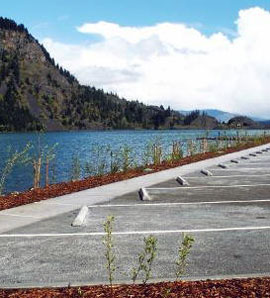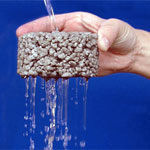Pervious Concrete Pavement
Reduces Stormwater Runoff
 Pervious concrete is made with little or no sand, producing a strong and durable pavement with voids that allow rain water to pass through. Pervious concrete pavements reduce or eliminate runoff and support pollution mitigation by capturing the first flush of rainfall and allowing it to percolate into the ground. Soil chemistry and biology can then "treat" the polluted water naturally. Pervious pavements reduce runoff that would otherwise burden streams with warm, polluted water and instead help replenish aquifers. This approach also reduces or eliminates the need for stormwater detention ponds with corresponding energy reductions and cost savings for the developer as well as the opportunity to make use of that otherwise unproductive land.
Pervious concrete is made with little or no sand, producing a strong and durable pavement with voids that allow rain water to pass through. Pervious concrete pavements reduce or eliminate runoff and support pollution mitigation by capturing the first flush of rainfall and allowing it to percolate into the ground. Soil chemistry and biology can then "treat" the polluted water naturally. Pervious pavements reduce runoff that would otherwise burden streams with warm, polluted water and instead help replenish aquifers. This approach also reduces or eliminates the need for stormwater detention ponds with corresponding energy reductions and cost savings for the developer as well as the opportunity to make use of that otherwise unproductive land.
Pervious concrete pavement systems are recognized as a valuable stormwater management tool under the requirements of the EPA Storm Water Phase II Final Rule. These regulations provide programs and practices to help control the amount of contaminants in waterways. Pervious concrete is a well-understood engineered product, with tested characteristics for compressive, tensile, flexural strength and freeze-thaw durability. Additional information regarding pervious concrete's applications, engineering properties, environmental benefits, structural and hydrological design characteristics, mix designs and construction techniques can be found at PerviousPavement.org.

This commentary-free video demonstrates the pervious concrete in action!


